Search the Special Collections and Archives Portal
Search Results
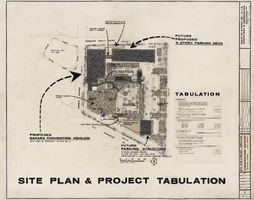
Architectural drawing of Sahara Hotel Convention Center (Las Vegas), site plan and project tabulation, November 17, 1966
Date
Archival Collection
Description
Architectural plans for the Sahara Hotel Convention Center from 1966. Printed on mylar. Berton Charles Severson, architect; Brian Walter Webb, architect.
Site Name: Sahara Hotel and Casino
Address: 2535 Las Vegas Boulevard South
Image
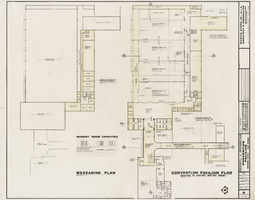
Architectural drawing of Sahara Hotel Convention Center (Las Vegas), pavilion floor and mezzanine plan, August 4, 1966
Date
Archival Collection
Description
Preliminary Sahara Hotel Convention pavilion plans, relation to existing meeting rooms plans from 1966. Printed on mylar. Berton Charles Severson, architect; Brian Walter Webb, architect; Masyoshi Tokubo, delineator.
Site Name: Sahara Hotel and Casino
Address: 2535 Las Vegas Boulevard South
Image
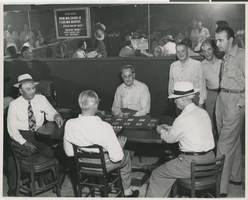
Photograph of a faro card game in the Boulder Club (Las Vegas), 1953
Date
Archival Collection
Description
Faro table in the Boulder Club Card Room. Transcribed from photo: "The card room at the back of the old Boulder Club where Larry Hazelwood played bridge, Jimmy Young played poker, etc. Permission to take this photo given by Jimmy Young, part owner along with Ken Houssels, Sr., Larry Hazelwood, Connie Hurley, and Mrs. Witcher. At the table left a shill from Horseshoe; right- Blackie- a Boulder Club shill; Standing behind Blackie, Boulder Club Bar manager, Ben; Standing next to Ben two regulars of the Boulder Club." Transcribed from photo sleeve: "About August, 1953"
Site Name: Boulder Club
Address: 118 East Fremont Street
Image

Photograph of YESCO workers installing Vegas Vic at the Pioneer Club (Las Vegas), 1951
Date
Archival Collection
Description
Workers installing the now-famous Vegas Vic sign on the front of the Pioneer Club. Stamped on back of photo: "Photo by Desert Sea News Bureau. Las Vegas, Nevada." Transcribed from photo sleeve: "First Highrise Hotel -- Center of action downtown throughtout the '30s was the Apache Hotel which boasted an elevator and a nitery downstairs. The corner is now Binion's Horseshoe, but the spot has undergone many name changes from Tony Cornero's 'S.S. Rex' to the Eldorado where the mobs were fighting for control of the race wire. Bugsy Siegel's influence was first felt here in the early '40s."
Site Name: Pioneer Club
Address: 25 East Fremont Street
Image
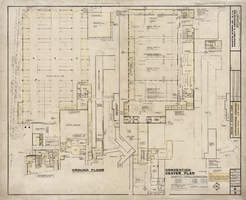
Architectural drawing of Sahara Hotel Convention Center (Las Vegas), ground and pavilion floor plan, March 22, 1967
Date
Archival Collection
Description
Architectural plans for the Sahara Hotel Convention Center from 1967. Includes revisions, notes, and banquet room capacities. Printed on mylar. Berton Charles Severson, architect; Brian Walter Webb, architect; Masyoshi Tokubo, delineator.
Site Name: Sahara Hotel and Casino
Address: 2535 Las Vegas Boulevard South
Image
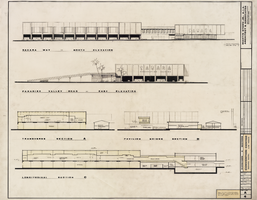
Architectural drawing of Sahara Hotel Convention Center (Las Vegas), elevations and sections, August 15, 1967
Date
Archival Collection
Description
Architectural plans for the Sahara Hotel Convention Center from 1967. Includes revisions. Printed on mylar. Berton Charles Severson, architect; Brian Walter Webb, architect; Masyoshi Tokubo, delineator.
Site Name: Sahara Hotel and Casino
Address: 2535 Las Vegas Boulevard South
Image
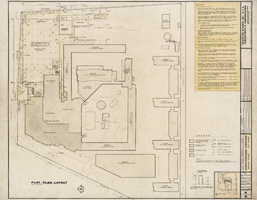
Architectural drawing of Sahara Hotel Convention Center (Las Vegas), plot plan, August 15, 1967
Date
Archival Collection
Description
Plot plan for the Sahara Hotel Convention Center from 1967. Includes revisions, key plan, and plot plan notes. Printed on mylar. Berton Charles Severson, architect; Brian Walter Webb; architect; Milton R. Bertrand, delineator.
Site Name: Sahara Hotel and Casino
Address: 2535 Las Vegas Boulevard South
Image
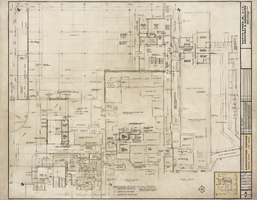
Architectural drawing of Sahara Hotel Convention Center (Las Vegas), ground floor plan, west, August 15, 1967
Date
Archival Collection
Description
Architectural plans for the Sahara Hotel Convention Center from 1967. Includes revisions and key plan. Printed on mylar. Berton Charles Severson, architect; Brian Walter Webb, architect; Milton R. Bertrand, delineator.
Site Name: Sahara Hotel and Casino
Address: 2535 Las Vegas Boulevard South
Image
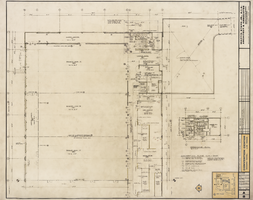
Architectural drawing of Sahara Hotel Convention Center (Las Vegas), convention floor plan, east, August 15, 1967
Date
Archival Collection
Description
Architectural plans for the Sahara Hotel Convention Center from 1967. Includes revisions and key plan. Drawn by P. and E.P.H. Printed on mylar. Berton Charles Severson, architect; Brian Walter Webb, architect.
Site Name: Sahara Hotel and Casino
Address: 2535 Las Vegas Boulevard South
Image
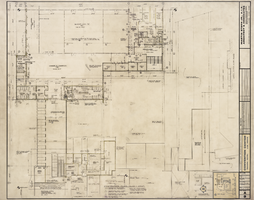
Architectural drawing of Sahara Hotel Convention Center (Las Vegas), convention floor plan, west, August 15, 1967
Date
Archival Collection
Description
West floor plan for the Sahara Hotel Convention Center from 1967. Includes revisions and key plan. Drawn by P. and E.P.H. Printed on mylar. Berton Charles Severson, architect; Brian Walter Webb, architect.
Site Name: Sahara Hotel and Casino
Address: 2535 Las Vegas Boulevard South
Image
